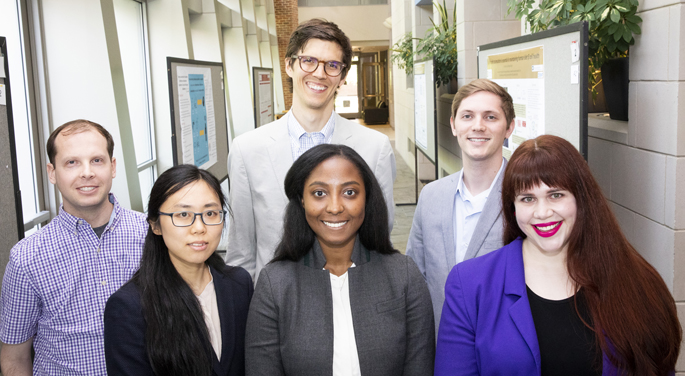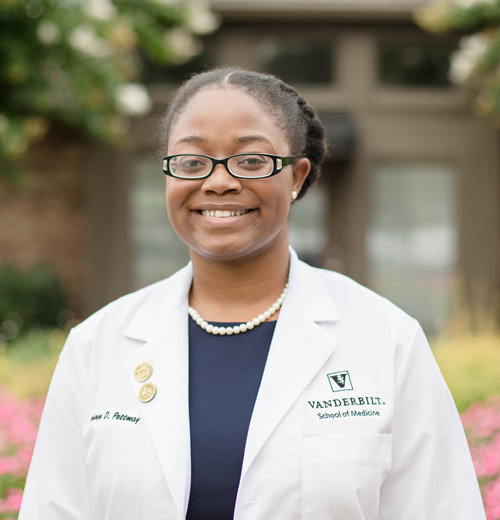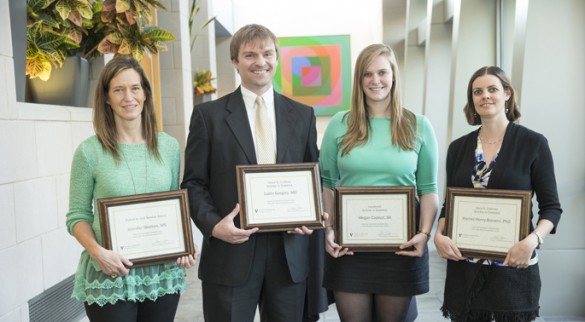
by Jill Clendening
Vanderbilt Diabetes Day, an annual event which showcases the work of outstanding scholars and researchers in the fields of diabetes and endocrinology from throughout the United States, looked quite a bit different in November 2020 as the attendees connected virtually for sessions presented over two days.
The event highlighted diabetes-related research at Vanderbilt, including that of trainees and young investigators. It featured a plenary presentation by Korey Hood, PhD, from Stanford University, and presentations by Vanderbilt faculty Rosette Chakkalakal, MD, MHS, Sheila Collins, PhD, and Richard Simerly, PhD.
The event’s organizers also used the opportunity to examine the impact of race throughout history on the treatment of individuals with diabetes as well as the vital need to address diversity and inclusion in diabetes research and clinical care.
“When we decided that Diabetes Day needed to be remote this year, we wanted to keep the focus on the goals for the event: sharing great science, showcasing the work of trainees and junior faculty, and forging new connections between members of the Diabetes Center,” said Sarah Jaser, PhD, associate professor of Pediatrics, who co-directed Diabetes Day. “I believe the two-day event allowed us to meet our goals in novel and interesting ways. While we hope to be in person for next year’s Diabetes Day, I feel confident that we will continue to enhance enrichment, no matter the format.”
Missing from the gathering were the one-on-one interactions that happen spontaneously when everyone is in one space, but smaller breakout sessions added to the agenda allowed discussion as well as a call to action to address disparities and encourage inclusion, said event co-director Sean Davies, PhD, associate professor of Pharmacology.
“The breakout sessions gave people a chance to share their experiences and ideas and to get to know others in the community better,” he said. “I think we all came away realizing that there is a lot we need to do, but also that collectively as a group, we have a strong desire to do better. I’m delighted that our virtual Diabetes Day was something that was a meaningful experience for everyone.”
During the event, Arleen Tuchman, PhD, a Vanderbilt University professor of History and expert in the history of science and medicine in the United States and Europe, spoke about racial inequities and injustice as related to diabetes.
“Racism and class prejudice have been a part of diabetes history for more than 100 years,” she told attendees. “And a consequence of this prejudice is that the dominant approach to erasing racial and class disparities in diabetes has been to turn to and really to blame biology and behavior for high rates of the disease, making it difficult to give more attention to and really to invest more resources in the social determinants of health.”
In the early 20th century diabetes was believed to be a disease that afflicted white people, especially Jewish individuals, more than any other race, and it was also thought to be a disease of the middle and upper class, Tuchman said. Some in the medical community used this misinformation to support their own antisemitism. Also, for decades research and treatment of diabetes focused on white populations, largely ignoring the Black community.
“These cultural messages about diabetes had lots of consequences, but I’m going to mention just one, and that is that it rendered diabetes invisible in communities of color until the 1960s,” Tuchman said. “This was despite the fact that a small group of physicians began in the 1930s to insist that diabetes was a growing problem in black communities as well. But they were not able to gain any traction; no one was paying attention to what they were saying.”
A large responsibility for addressing social disparities and inequity in research falls firmly on the shoulders of the scientific community, said Lindsay Mayberry, PhD, a member of the event’s planning committee.
“A lot of the time we think about the forces that restrict representation of diverse voices in science as institutional, systemic and outside of our control,” she said. “While they are all of those things, we also are the Academy, we are scientists, we — from trainees all the way up to directors of our center — have opportunities to create change.”
Diabetes Day was sponsored by the Vanderbilt Diabetes Research and Training Center (VDRTC) and the Vanderbilt Center for Diabetes Translation Research and supported by the National Institutes of Diabetes and Digestive and Kidney Diseases (NIDDK).















